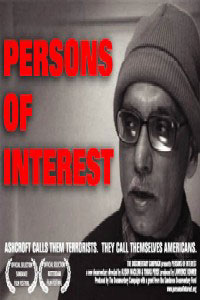Persons of Interest (2004) (NR)

synopsis
A chronicle that depicts the human cost of the U.S. Justice Department's campaign against Arab or Muslim immigrants during the post-9/11 frenzy to combat terrorism. While few question the need to undertake measures to protect national security, the sweeping detention, arbitrary arrests and confinement (often without any family communication or legal representation), and subsequent deportation and/or ongoing imprisonment make a mockery of fundamental American principles like the presumption of innocence. Using a bare room and mostly static camera, the filmmaker's record a series of encounters with a diverse range of detainees and family members and present them seemingly without much need for skill. But in fact, the subtle and creative direction of these individual and ultimately cumulative portraits belies the effortless appearance of the presentation and produces a simultaneous poignancy and disbelieving outrage. You may feel that you already know all about the issues and experiences communicated in Persons of Interest. Think again. The specific details of these disrupted lives speak volumes. Not since the massive internment of another ethnic group during World War II has the United States experienced such a massive assault on basic civil liberties.
details
Documentary
1 hr. 3 min.
Opened September 3rd, 2004

To get the full Quicklook Films experience, uncheck "Enable on this Site" from Adblock Plus
synopsis
A chronicle that depicts the human cost of the U.S. Justice Department's campaign against Arab or Muslim immigrants during the post-9/11 frenzy to combat terrorism. While few question the need to undertake measures to protect national security, the sweeping detention, arbitrary arrests and confinement (often without any family communication or legal representation), and subsequent deportation and/or ongoing imprisonment make a mockery of fundamental American principles like the presumption of innocence. Using a bare room and mostly static camera, the filmmaker's record a series of encounters with a diverse range of detainees and family members and present them seemingly without much need for skill. But in fact, the subtle and creative direction of these individual and ultimately cumulative portraits belies the effortless appearance of the presentation and produces a simultaneous poignancy and disbelieving outrage. You may feel that you already know all about the issues and experiences communicated in Persons of Interest. Think again. The specific details of these disrupted lives speak volumes. Not since the massive internment of another ethnic group during World War II has the United States experienced such a massive assault on basic civil liberties.
details
Documentary
1 hr. 3 min.
Opened September 3rd, 2004






